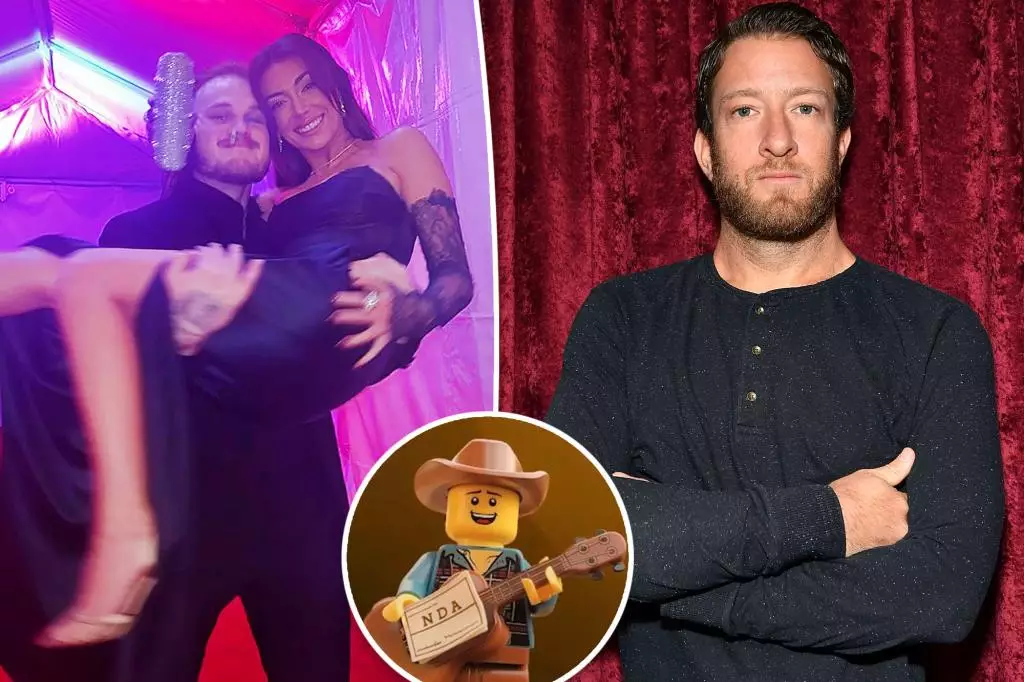The world of social media and entertainment often sees volatile displays of rivalry and reaction, particularly when personal relationships are juxtaposed with public personas. The recent fracas between Barstool Sports founder Dave Portnoy and country singer Zach Bryan exemplifies this chaos, showing how the intertwining of personal grievances and professional jabs can culminate in explosive artistic expressions. Through his latest diss track, Portnoy not only unleashes his ire towards Bryan but also highlights broader themes of personal integrity, public perception, and the impact of financial power on relationships.
Portnoy’s new diss track serves as a potent reminder of music’s role as a tool for social commentary and personal expression. By directly addressing Bryan in his lyrics, Portnoy transforms a personal spat into a broader critique of the celebrity culture that often shields individuals from accountability. He refers to Bryan as “Country Diddy,” an evocative moniker that insinuates a parallel between the country singer and the troubled rapper Sean “Diddy” Combs, currently embroiled in serious legal issues. This comparison not only serves to undermine Bryan’s public image but also raises questions about the moral responsibilities of artists in today’s media climate.
The choice of lyrics, such as “All these NDAs you sound like a country Diddy,” points to an accusatory tone, suggesting that Bryan employs legal tactics to silence dissent and maintain a facade. This prevalent trend in celebrity culture—where financial settlements often come at the cost of transparency and truth—illustrates the ongoing struggle for authenticity amidst the glamour of success. Portnoy’s defiance, showcased in lines like “Someone tell your cheap lawyers I don’t give a f–k,” highlights his rejection of what he perceives as a manipulative strategy by Bryan to control the narrative.
The song’s context cannot be divorced from the personal relationship between Bryan and Brianna “Chickenfry” LaPaglia. LaPaglia has publicly declared the diss track as “lethal” and has also shared her own harrowing experience with Bryan, alleging emotional abuse and manipulation during their relationship. Her claims that Bryan attempted to silence her with a staggering $12 million offer bring to light unsettling dynamics within relationships marked by fame and wealth.
Social media platforms have accelerated the phenomenon where personal disputes are broadcasted and scrutinized on public stages. LaPaglia’s Instagram statement and her accompanying revelations from the “BFFs” podcast serve to engage audiences even further. Her assertion that previous partners of Bryan felt compelled to take financial settlements for silence amplifies the discourse surrounding women’s agency, especially in a patriarchal entertainment industry. The track not only garners attention for Portnoy but also acts as a rallying point for those critical of how powerful figures navigate their interactions and relationships.
Portnoy’s musical attributes—using humor and satire as weapons—demonstrate yet another layer to the clash. By employing a Lego figure in the music video, symbolically representing Bryan and juxtaposing him against visuals of NDAs and wealth, Portnoy not only mocks Bryan but also parodies the absurdity of celebrity lifestyle. The creativity implemented in the animation mirrors the innovative, sometimes bizarre spirit of diss tracks in general, which often act as cultural commentaries aimed at examining the idiosyncrasies of fame.
Expressing his intent to produce countless diss tracks in the face of censorship, Portnoy embraces the very essence of rebellion against authority and suppression. His departure from the confines of traditional music production illustrates a continual evolution in how artists approach conflict; it signifies a willingness to harness creativity, even in retaliation, challenging the status quo.
The discord between Dave Portnoy and Zach Bryan emphasizes a larger conversation regarding personal accountability in a world where public image often takes precedence. As Portnoy’s tracks resonate amid this cultural backdrop of celebrity disputes, they also remind us of the power of expression as a tool for confronting injustice and illuminating truths. As the dust settles, it remains to be seen how this musical exchange will influence perceptions of both figures and contribute to the ongoing dialogue around power dynamics within fame. In today’s interconnected society, the implications of such public disputes reach far beyond individual narratives, influencing cultural sentiment and social discourse.

